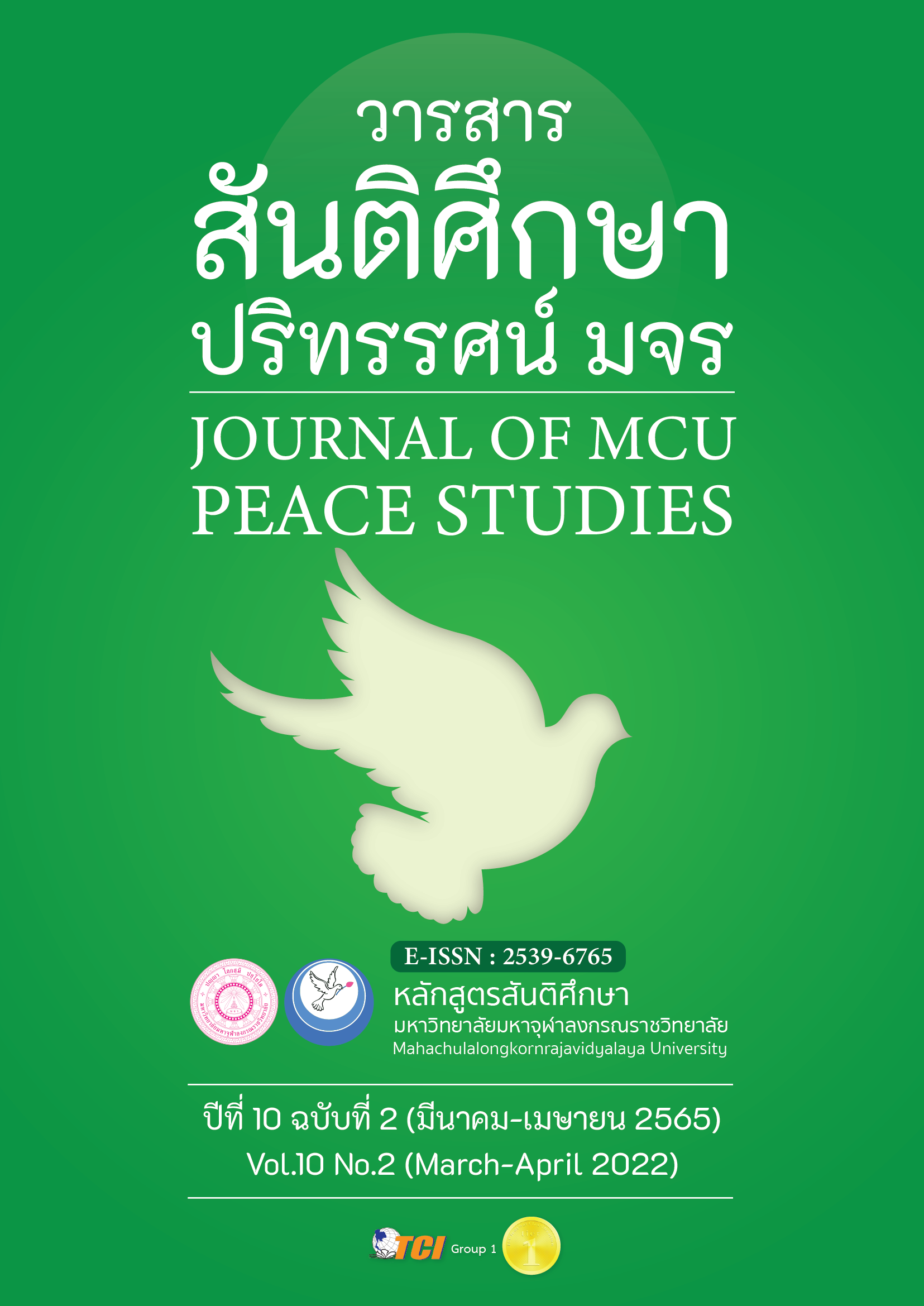การศึกษาเรื่องปัจจัยที่มีผลต่อผลสัมฤทธิ์ของการเรียนการสอน แบบออนไลน์ภายใต้สถานการการแพร่ของเชื้อไวรัส COVID-19
Main Article Content
บทคัดย่อ
บทความวิจัยนี้มีวัตถุประสงค์เพื่อศึกษาระดับของปัจจัยและผลสัมฤทธิ์ของการเรียนการสอนแบบออนไลน์ และเพื่อศึกษาปัจจัยที่มีผลต่อผลสัมฤทธิ์ของการเรียนการสอนแบบออนไลน์ ของนักเรียนระดับมัธยมศึกษาในโรงเรียนของรัฐในพื้นที่กลุ่มจังหวัดภาคตะวันออก 1 เป็นการวิจัยเชิงปริมาณ โดยเน้นการลงพื้นที่เพื่อเก็บข้อมูลกับผู้ปกครองของนักเรียน จำนวน 400 คน แล้วใช้การวิเคราะห์ข้อมูลโดยใช้สถิติ Multiple regression analysis เพื่อวิเคราะห์ข้อมูลที่จะใช้ตอบคำถามของการวิจัยครั้งนี้
ผลการศึกษาพบว่า ระดับของปัจจัยที่ศึกษาสรุปได้ดังนี้ 1) ด้านความพร้อมของสิ่งอำนวยความสะดวก มีระดับปัจจัยเฉลี่ย 3.763 2) ด้านบทเรียน มีระดับปัจจัยเฉลี่ย 3.652 3) ด้านตัวผู้เรียน มีระดับปัจจัยเฉลี่ย 3.709 4) ด้านตัวผู้สอน มีระดับปัจจัยเฉลี่ย 3.728 และ 5) ด้านสภาพแวดล้อม มีระดับปัจจัยเฉลี่ย 3.756
โดยทั้ง 5 ปัจจัย มีระดับปัจจัยอยู่ในระดับมาก ส่วนระดับผลสัมฤทธิ์ของการเรียนการสอนแบบออนไลน์
1) ด้านผลการเรียน มีระดับค่าเฉลี่ยเท่ากับ 3.728 2) ด้านทัศนคติ มีระดับค่าเฉลี่ยเท่ากับ 3.744 3) ด้านการ
มีส่วนร่วมในกิจกรรมการเรียน มีระดับค่าเฉลี่ยเท่ากับ 3.729 และ 4) ด้านความพึงพอใจ มีระดับค่าเฉลี่ยเท่ากับ 3.731 โดยทั้ง 5 ด้าน มีระดับปัจจัยอยู่ในระดับมาก ในขณะที่ ปัจจัยที่มีผลต่อระดับความคิดเห็นด้านผลสัมฤทธิ์ของการเรียนการสอนแบบออนไลน์ ได้แก่ 1) ด้านความพร้อมของสิ่งอำนวยความสะดวก ประกอบด้วย 4 ปัจจัยย่อย สามารถพยากรณ์ได้ร้อยละ 7.90 2) ด้านบทเรียน ประกอบด้วย 5 ปัจจัยย่อย สามารถพยากรณ์ได้ร้อยละ 23.80 3) ด้านตัวผู้เรียน ประกอบด้วย 7 ปัจจัยย่อย สามารถพยากรณ์ได้ร้อยละ 33.30 4) ด้านตัวผู้สอน ประกอบด้วย 8 ปัจจัยย่อย สามารถพยากรณ์ได้ร้อยละ 33.10 และ 5) ด้านสภาพแวดล้อม ประกอบด้วย 4 ปัจจัยย่อย สามารถพยากรณ์ได้ร้อยละ 18.30 ที่นัยสำคัญทางสถิติ 0.05
Article Details

อนุญาตภายใต้เงื่อนไข Creative Commons Attribution-NonCommercial-NoDerivatives 4.0 International License.
ทัศนะและความคิดเห็นที่ปรากฏในบทความในวารสาร ถือเป็นความรับผิดชอบของผู้เขียนบทความนั้น และไม่ถือเป็นทัศนะและความรับผิดชอบของกองบรรณาธิการ ยินยอมว่าบทความเป็นลิขสิทธิ์ของวารสาร
เอกสารอ้างอิง
Alibak, M., Talebi, H., & Neshatdoost, H. (2019). Development and Validation of a Test Anxiety Inventory for Online Learning Students. Journal of Educators Online 2019, 16(2), 5-12.
Alicai, L. (2006). Reading and the Internet: A Comparison of Reading on the Internet and Reading Print in French by French Immersion Student. Retrieved August 7, 2021, from http://www.lib.umi.com/dissertations/fillcil/
Anastasi, A. (1970). On the formation of psychological traits. American Psychologist, 25(10), 99–910.
Beaudrie, B. P. (2000). Analysis of group problem-solving tasks in a geometry course for teachers using computer-mediated conferencing. (Doctoral Dissertation). Montana State University. Bozeman.
Bloom, B. (1976). Human Characteristic and School Learning. New York: McGraw-Hill.
Carter, B. M., & Krulik, S. (2004). An analysis and comparison of the effects of computerassisted instruction versus traditional lecture instruction on student attitudes and achievement in a college remedial mathematics course. Founder's Garden: Temple University.
Daniel, D.R. (1961). Management Information Crisis. Harvard Business Review, 39(5), 80-85.
Davis, L. E. (1977). Enhancing the quality of work life: Development in the United States. International Labor Review, 116, 47-53.
Hill, B. (2020). Coronavirus: origins, signs, prevention and management of patients. British Journal of Nursing, 29(7), 399-402.
Laorungruang, J. (2018). The Internet use behavior and academic achievement. A case study of students of Rajamangala University of Technology Phra Nakhon. (Master’s Thesis). Thammasat University. Bangkok.
Michels, D.M. (2006). Two-Years Colleges and Internet: An Investigation of the Integration Practices and Beliefs of Faculty User. Minneapolis, MN: University of Minesota.
Mohammadi, N., Ghorbani, V., & Hamidi, F. (2011). Effects of e-learning on Language Learning. Procedia Computer Science, 3, 464-468.
Nawarat, S. (2018). Factors affecting academic achievement according to students' opinions. Professional certificate level Commercial branch of a vocational school. (Master’s Thesis), Siam University. Bangkok.
Office of the Higher Education Commission. (2018). 20-year long-term higher education plan 2018 – 2037. Bangkok: Chili-Wan Graphic.
Prescott, D. A. (1961). The child in the educative process. New York: McGraw - Hall.
Pornsamrit, Y, Pannee, L., & Paitoon, P. (2018). Development of e-learning lessons through a problem situation to promote academic achievement of problem situation analysis of Mathayomsuksa 2, Krathum Baen Wiset Samutkhun School. The 1 1th National Academic Conference on Education Online. Faculty of Industrial Education and Technology King Mongkut's Institute of Technology Ladkrabang.
Ruchiraphan, K. (2016). Causal relationship model of factors influencing academic achievement of students of faculty of education, Southern region Rajabhat University. Songkhla: Songkhla Rajabhat University.
Supaporn, P. (2019). E-learning development strategies to meet the needs of the 21st Century. (Master’s Thesis), College of management, Mahidol University. Nakhon Pratom.
Vasilis, G. (2013). Student teachers’ perception about the impact of internet usage on their learning and jobs. Online Information Review ELSEVIER Computer & Education, 62, 1–7.
Yamane, T. (1967). Statistics: An Introductory Analysis (2nd Ed.). New York: Harper and Row.


